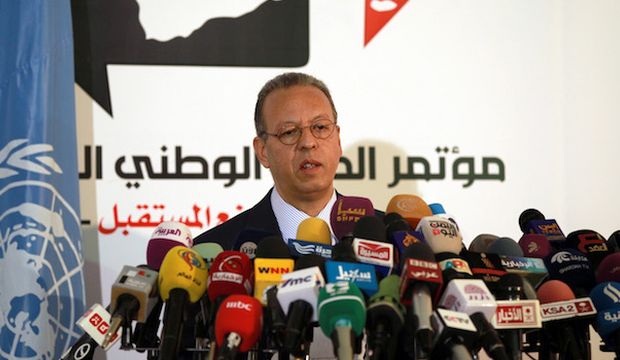Aside from accusations leveled against former UN envoy to Yemen Jamal Benomar by Yemen’s politicians—who have said he lied to the UN Security Council and sought to legitimize the Houthi coup, as well as blaming him for the current catastrophic situation in Yemen—the simple truth is that the Moroccan diplomat has directed a powerful blow to the UN, its envoys and the secretary-general. There is little confidence left in any UN envoy to Yemen, particularly Benomar’s Mauritanian successor Ismail Ould Cheikh Ahmed, who has inherited contradictions, incomprehensible relations and ambiguous goals. This is not to mention the bad reputation Benomar has established for every UN envoy around the world.
Throughout the four years Benomar spent working to broker a peaceful transition in Yemen, Yemenis were circulating several rumors about his bias towards the Houthi militia and how he tried to impose the group’s views on Yemen’s factions while exploiting the authority of the UN secretary-general. Benomar undoubtedly established himself as the envoy of the Houthi movement ever since he stood proudly announcing the Peace and Partnership Agreement in September. The Yemeni people saw in this deal a ticking time-bomb that undermined the political dialogue, violated legitimacy, and imposed the Houthi takeover as a fait accompli with force of arms. Nevertheless, Benomar strenuously sought to finalize the deal even after the Houthis detained President Abd Rabbuh Mansur Hadi, Prime Minister Khaled Bahah, and his ministers.
Benomar’s bizarre claims that Operation Decisive Storm aborted a possible political deal in Yemen are nothing more than the last in a series of attempts aimed at enabling the Houthis to seize power.
Benomar was supposed to act as a representative of the UN, not himself. He isolated himself not only from legitimate President Hadi but from the UN Security Council’s Resolution 2216, an indication of his gradual tendency to represent his convictions and personal views rather than the orientations of the Council itself. This, without doubt, raises suspicions about his character and personal interests as well as questions about the reasons behind his embracing the Houthis and Saleh’s militias. It also raises several questions for the Gulf and the international community regarding Benomar’s strange behavior. Stranger still was the failure of the UN secretary-general to intervene; he instead left his envoy to set an agenda that diverged from that of the UN.
Benomar has resigned from his post and left for New York, where he is now promoting a ridiculous story that Operation Decisive Storm aborted a potential political deal in Yemen. It has escaped the Moroccan diplomat to explain to the world just how such a deal would have succeeded with the Houthis detaining and later pursuing the president to Aden and shelling his residence there. Benomar has not stayed true to his position as a representative to the UN secretary-general, and has not been clear about which party in Yemen is really disrupting the political process, a stance that has been frankly declared by the UN Security Council. Instead, Benomar chose to play on words while playing down the Houthi coup and insisting on implementing the Peace and Partnership Agreement no matter what disaster it held for the future of Yemen and its people.
Operation Decisive Storm did not abort the alleged political deal; it only aborted the legitimization of the Houthi coup, a project Benomar seems to have been carrying out for years, before failing miserably.
